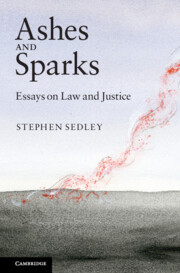Book contents
- Frontmatter
- Contents
- Preface
- Acknowledgements
- PART I History
- PART II Law
- PART III Justice
- 24 The right to know
- 25 The moral economy of judicial review
- 26 Policy and law
- 27 Responsibility and the law
- 28 The Crown in its own courts
- 29 Human rights – who needs them?
- 30 Fundamental values – but which?
- 31 Overcoming pragmatism
- 32 Sex, libels and video-surveillance
- 33 This beats me
- 34 Public inquiries: a cure or a disease?
- 35 Human rights: a twenty-first century agenda
- 36 Are human rights universal, and does it matter?
- 37 Bringing rights home: time to start a family?
- 38 The four wise monkeys visit the marketplace of ideas
- Index
- References
34 - Public inquiries: a cure or a disease?
Published online by Cambridge University Press: 05 June 2012
- Frontmatter
- Contents
- Preface
- Acknowledgements
- PART I History
- PART II Law
- PART III Justice
- 24 The right to know
- 25 The moral economy of judicial review
- 26 Policy and law
- 27 Responsibility and the law
- 28 The Crown in its own courts
- 29 Human rights – who needs them?
- 30 Fundamental values – but which?
- 31 Overcoming pragmatism
- 32 Sex, libels and video-surveillance
- 33 This beats me
- 34 Public inquiries: a cure or a disease?
- 35 Human rights: a twenty-first century agenda
- 36 Are human rights universal, and does it matter?
- 37 Bringing rights home: time to start a family?
- 38 The four wise monkeys visit the marketplace of ideas
- Index
- References
Summary
Public inquiries can deflect public criticism and anger; they can lay troublesome issues to rest in ways that neither litigation nor ministerial reassurances can; but they can also spiral out of control in time, in cost and in what they reveal or establish.
This paper was delivered as the Mary Robertson Lecture at Nottingham University in 1988 and subsequently published in the Modern Law Review. A good deal has happened since I wrote it. Legislation has systematised and centralised the inquiry process, but with a price tag – a ministerial power to move the goalposts while the match is in progress.
The issues the paper considers are nevertheless still very much alive. The European Court of Human Rights has not only compelled us to improve some of our more opaque inquest procedures but has given inquests, where death has occurred at or in the hands of the state, a further raison d'être.
If public inquiries are to be known by their fruits, and if their proper fruits are reforms and improvements in law and practice, there is probably not a great deal to be said for them. In the field of child care, it is safe to say that only the very first of the numerous public inquiries held in the last five decades either brought about or helped to shape a major reform in the law: Sir Walter Monckton's report in 1945 on the death of Denis O'Neill played an important part in the genesis of the Children Act 1948.
- Type
- Chapter
- Information
- Ashes and SparksEssays On Law and Justice, pp. 335 - 347Publisher: Cambridge University PressPrint publication year: 2011



